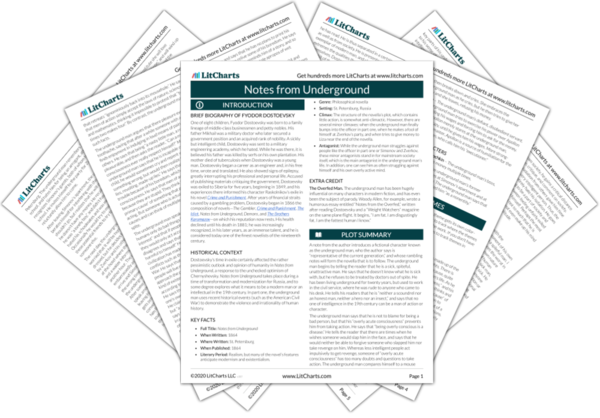Summary
Analysis
A note from the author informs the reader that the following notes and their author (the underground man) are both fictional, but that people like the underground man must exist in society. The author says that the underground man is “representative of the current generation,” and tells the reader that in the first part of the following book (called “Underground”) the underground man introduces himself, while the second part (“Apropos of Wet Snow”) contains the man’s notes about “several events in his life.”
The underground man is presented to the reader as representative to some degree of all human nature. The author’s note foregrounds the notes to follow as the apparently authentic writings of the underground man, who writes about his own experiences.
Themes
The underground man begins by telling the reader, “I am a sick man. . . I am a spiteful man. I am an unattractive man.” He says he isn’t sure what is wrong with him and refuses to be treated by doctors “out of spite.” He says that he realizes he will accomplish nothing by refusing the treatment of doctors, but refuses nonetheless, saying, “My liver hurts? Good, let it hurt even more!”
The underground man says he’s been living underground for about twenty years. He used to be “in the civil service,” and makes a joke about how he took pleasure in being rude because he had to have fun somehow since he wasn’t taking bribes. He tells the reader that’s a bad joke, but says he defiantly won’t cross it out. He says he was rude and spiteful to whoever came to his desk, but “to no effect.” Then he says he was lying and was not really a spiteful official. He says he often felt “contradictory elements” swarming inside him.
The underground man lives an isolated life underground. Through writing, the underground man approaches a kind of conversation with his imagined readers to compensate for his loneliness. He often contradicts or corrects himself, showing his illogical ability to hold contrary positions or opinions and the way his intelligence creates a kind of paralysis in him.
Themes
The underground man says that he couldn’t be spiteful, but he couldn’t be good either. He was “neither a scoundrel nor an honest man, neither a hero nor an insect.” He says that anyone of intelligence in the 19th century cannot be a man of character or of action. He tells his readers that he can sense they are irritated with him, and says he will tell them who he is: he is a “collegiate assessor” in St. Petersburg. He says he will continue to talk about himself.
The underground man generalizes from his own predicament to say that anyone of intelligence cannot be a man of action. He provides an example by which to understand human nature more generally. Intellectual thought and action are presented as, at least to some degree, mutually exclusive.
Themes
Get the entire Notes from Underground LitChart as a printable PDF.













